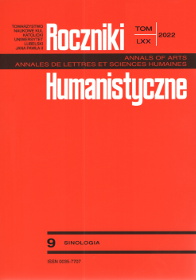The Place and Role of Sino-Confucian Culture and Confucianism in World History according to Liang Shuming’s Thought on Life and Culture
Abstract
Liang Shuming’s understanding of Chinese culture, which he conceived of as Sino-Confucian culture, and his understanding of Confucianism differ from the common and familiar understandings in the sinological academic world. It seems that the best way to understand Liang Shuming and his thoughts is in terms of his search for an authentic existence. In his scheme of three modes of world cultures (Western-pragmatic culture, Sino-(Taizhou 泰州-)Confucian culture, and Indo-(weishi-)Buddhist culture) and their historical succession (as given above), the conviction of Liang Shuming was that the imminent future mode of world culture would be that of the Sino-Confucian cultural attitude. He even prophesied that in the nearest future the emotion of love in its particular form as love between a man and a woman would be the greatest and the most formidable problem of this period, i.e. the period of the second domain of a conditional availability or non-availability of the object of desire, that is, of another mind or the will of another person. This domain is called by Liang Shuming the realm of human relationships, or a social problem for the solution of which Sino-(Taizhou-)Confucian culture is responsible. The author concentrates on the place and role of Liang Shuming’s understanding of Confucianism in his scheme of world history.
References
Adcock Kaufman, Alison. “The ‘Century of Humiliation,’ Then and Now: Chinese Perceptions of the International Order.” Pacific Focus vol. 25, no. 1, 2010, pp. 1-33.
Alitto, Guy S. The Last Confucian. Liang Shu-ming and the Chinese Dilemma of Modernity. University of California Press, 1979.
Alitto, Guy S. The Conservative as Sage: Liang Shu-ming.” The Limits of Change. Essays on Conservative Alternatives in Republican China, ed. Charlotte Fürth, Harvard University, 2005, pp. 213-241,
Cheng, Yu-Yin. “The Taizhou School (Taizhou xuepai 泰州學派) and the Popularization of Liangzhi 良知 (Innate Knowledge).” Ming Studies vol. 60, 2009, pp. 45-65.
Flew, Antony G.N., editor. Logic and Language. Basil Blackwell, 1951.
Hanafin, John J. “The ‘Last Buddhist’: The Philosophy of Liang Shuming.” New Confucianism: A Critical Examination, ed. John Makeham 梅約翰 梅约翰, Palgrave Macmillan, 2003, pp. 187-218.
Kuhn, Philip A. “Origins of the Taiping Vision: Cross-Cultural Dimensions of a Chinese Rebellion.” Comparative Studies in Society and History vol. 19, no. 3, 1977, pp. 350-366.
Liang, Shuming. Fundamentals of Chinese Culture. Trans. Li Ming. Amsterdam University Press, 2021.
Major, Philippe. “Textual Authority and Its Naturalization in Liang Shuming’s Dong – Xi wenhua ji qi zhexue.” Monumenta Serica vol. 65, no. 1, 2017, pp. 123-145.
Meynard, Thierry. The Religious Philosophy of Liang Shuming: The Hidden Buddhist. Brill, 2011.
Poškaitė, Loreta. “Filial Piety (xiao 孝) in the Contemporary and Global World: A View from the Western and Chinese Perspectives.” Asian Studies II vol. 18, no. 1, 2014, pp. 99-114.
Qi, Xiaoying. “Filial Obligation in Contemporary China: Evolution of the Culture-system.” Journal for the Theory of Social Behaviour vol. 45, no. 1, 2015, pp. 141-161.
Streng, Frederick J. “Three Approaches to Authentic Existence: Christian, Confucian, and Buddhist.” Philosophy East and West vol. 32, no. 4, 1982, pp. 371-392.
Tu, Wei-ming. “Hsiung Shih-li’s Quest for Authentic Existence.” The Limits of Change: Essays on Conservative Alternatives in Republican China, ed. Charlotte Furth, Harvard University Press, 1976, pp. 242-273 and 396-400. Also in: Tu Wei-ming. Humanity and Self-Cultivation: Essays in Confucian Thought. Cheng & Tsui Company, 1998, pp. 219-256.
Wesołowski, Zbigniew. “Liang Shumings (1893-1988) Religionsbegriff.” “Fallbeispiel” China. Ökumenische Beiträge zu Religion, Theologie und Kirche im chinesischen Kontext (China – Model Case. Ecumenical Contributions on Religion, Theology, and Church within the Chinese Context), ed. Roman Malek, Steyler Verlag, 1996, pp. 241-267.
Wesołowski, Zbigniew. Lebens- und Kulturbegriff von Liang Shuming (1893-1988). Dargestellt anhand seines Werkes Dong-Xi wenhua ji qi zhexue 東西文化及其哲學. Institut Monumenta Serica, 1997.
Wesołowski, Zbigniew (Wei Siqi 魏思齊). Liang Shuming (1893-1988) de wenhua guan: genju Dong–Xi wenhua ji qi zhexue yu Zhongguo wenhua yaoyi 梁漱溟 (1893-1988)的文化觀-根據《東西文化及其哲學》與《中國文化要義》解說 (Liang Shuming’s [1893-1988] Concept of Culture Based on his Works: Dong-Xi wenhua ji qi zhexue and Zhongguo wenhua yaoyi). Furen daxue chubanshe, 2003.
Wesołowski, Zbigniew. “Understanding the Foreign (the West) as a Remedy for Regaining One’s Own Cultural Identity (China): Liang Shuming’s (1893-1988) Cultural Thought”. Monumenta Serica vol. 53, 2005, pp. 361-399.
Whyte, Martin. “Filial Obligations in Chinese Families: Paradoxes of Modernization.” Filial Piety: Practice and Discourse in Contemporary East Asia, ed. Charlotte Ikels, Stanford University Press, 2004, pp. 106-127.
Yang, Xiaomei. “How to Make Sense of the Claim ‘True Knowledge is What Constitutes Action’: A New Interpretation of Wang Yangming’s Doctrine of Unity of Knowledge and Action.” Dao vol. 8, 2009, pp. 173-188.
Zhexue da cidian: Zhongguo zhexue shi juan 哲學大詞典:中國哲學史卷, ed. Yan Beiming 嚴北溟, Shang-hai ci-shu chu-ban-she, 1985.
Copyright (c) 2022 Roczniki Humanistyczne

This work is licensed under a Creative Commons Attribution-NonCommercial-NoDerivatives 4.0 International License.





